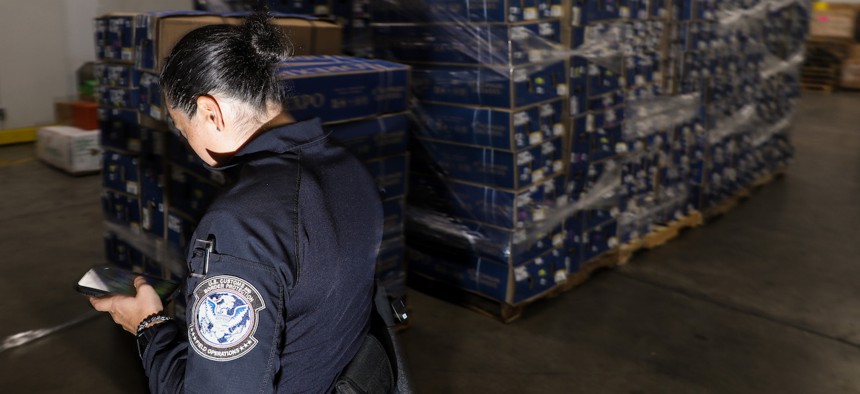
Pallets of imported flowers wait to be inspected by Customs and Border Protection agriculture specialists, at Gourmet Trading, in Redondo Beach, Calif., on May 10, 2023. Complainants said pregnant employees at the agency were treated differently than others who went on temporary status. Jay L. Clendenin / Los Angeles Times via Getty Images
Pregnant employees ruled eligible for class action discrimination lawsuit against CBP
The employees allege they were improperly forced to surrender duties upon notifying supervisors of their pregnancies.
Potentially hundreds of Customs and Border Protection employees can move forward as a class in their lawsuit against the agency for alleged discrimination against pregnant staff, after a new ruling that dismissed CBP’s objections.
The Homeland Security Department component has allegedly discriminated against certain pregnant women for years by forcing them to forfeit some of their duties, according to the lawsuit, which brought its complaint to the Equal Employment Opportunity Commission. A regional EEOC administrative judge previously ruled in the employees’ favor, but CBP rejected the decision and it appealed it rather than notifying other class members of their eligibility to participate in the class action.
In a new ruling on Wednesday, Carlton Hadden, director of EEOC’s Office of Federal Operations, reversed CBP’s order rejecting the judge’s decision. Instead, Hadden recertified the class, saying the plaintiffs met their thresholds for moving forward. EEOC appeared to suggest the complaintaints stood on firm ground in their case against the government.
Now, any pregnant CBP employee required to enter “temporary light duty,” or TLD, since July 2016 would be eligible to join the class. EEOC noted there are more than 500 women who were placed on TLD in that time and may now be eligible to sign their names to the case.
According to agency policy and protections afforded by the 1978 Pregnancy Discrimination Act, pregnant employees should only enter light duty status if they request it. Instead, the complainants said, their supervisors required them to surrender some duties as soon as their pregnancies were disclosed. They said temporary light duty status offers fewer chances for overtime and other differential pay, lowers the chances of promotions, allows for fewer training opportunities, makes preferred schedules more difficult to earn and requires the surrendering of their right to carry a firearm. In some cases, they added, employees then have to requalify to carry their gun.
Pregnant employees were treated differently than others who went onto the temporary status, they said, as they were never provided an opportunity to prove they could still carry out their normal duties.
"When I let my supervisors know I was pregnant, it should have been a moment of shared joy and excitement,” said Roberta Gabaldon, a CBP employee and a class agent who helped bring the case. “Instead, I was devastated to endure a humiliating forced reassignment and a complete disregard for my ability to keep working as I was trained to and in a job that I loved. I'm grateful to the EEOC for upholding our class certification and hope that through this decision we can create meaningful change at the agency."
CBP, which did not respond to a request for comment, must in the next 15 days “use all reasonable means” to contact all potential class members to inform them of the class’ certification, the EEOC official ordered. That should include emailing, hand delivery of a notice or mailing a notice to their last known address. The agency has 30 days to once again appeal the decision further up the commission.
In its previous appeal, CBP argued it had failed to prove more than the two-dozen employees who have so far signed onto the case faced any discrimination. It also said the complainants lacked “commonality” that is required for a class-action case. If mandatory TLD occurred, it went against agency policy and was required only because supervisors were acting without proper authority, the agency argued.
EEOC rejected those arguments, however, noting the women making the complaints suggested they were scared to tell management they were pregnant and they knew of many more colleagues in similar positions.
“The agency fails to cite to a single piece of evidence showing that any individual supervisor acted independently regarding the temporary light duty assignment for a class member,” Hadden said.
EEOC also found employees were “treated in a consistent manner” in duty stations across the country once management found out they were pregnant.
“The agency also asserts that its policy stipulates that an employee initiates the request for temporary light duty, but the evidence shows that pregnant employees suffered from a practice to immediately place them onto temporary light duty once a pregnancy was disclosed,” Hadden added.
He further said the practice had real impacts on class members.
“Due to their reassignments into these light duty positions, class agents’ compensations were affected, in addition to their abilities to qualify for promotions; take trainings; and bid on positions,” Hadden said.
If CBP declines to appeal further, it must notify the EEOC field office in New Orleans that it requires a hearing on the merits of the case.
"A worker's pregnancy does not define their ability to work, and yet the CBP field offices have operated under that assumption for years,” said Joe Sellers, an attorney at Cohen, Milstein, Sellers and Toll who is representing the plaintiffs. “Now that the EEOC has upheld class certification, we can continue to pursue accountability on behalf of our clients and bring the agency's policies in line with the 21st century."







